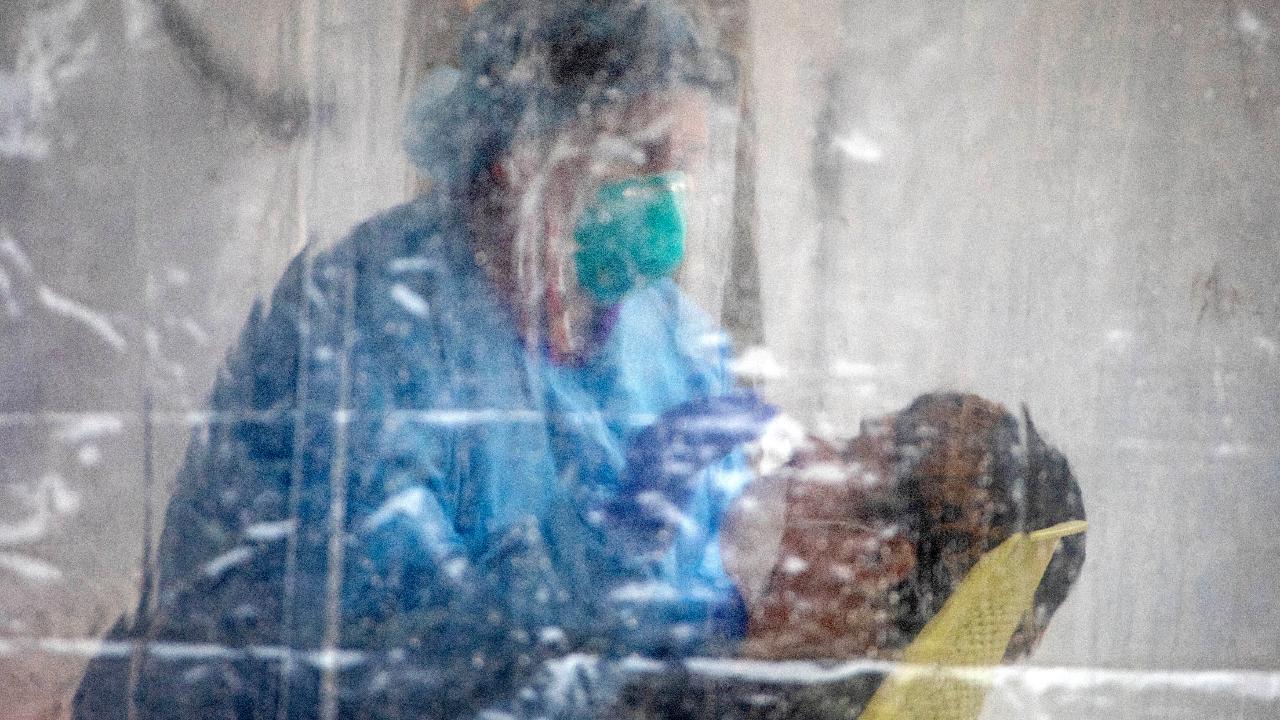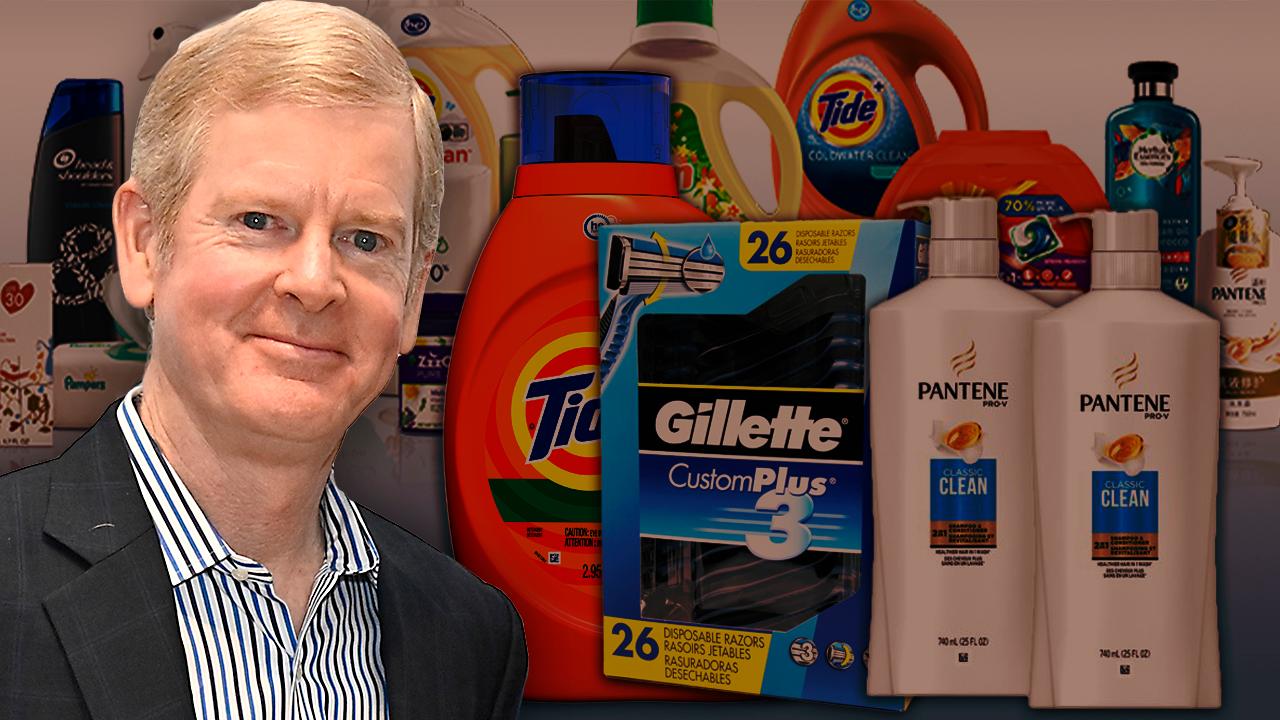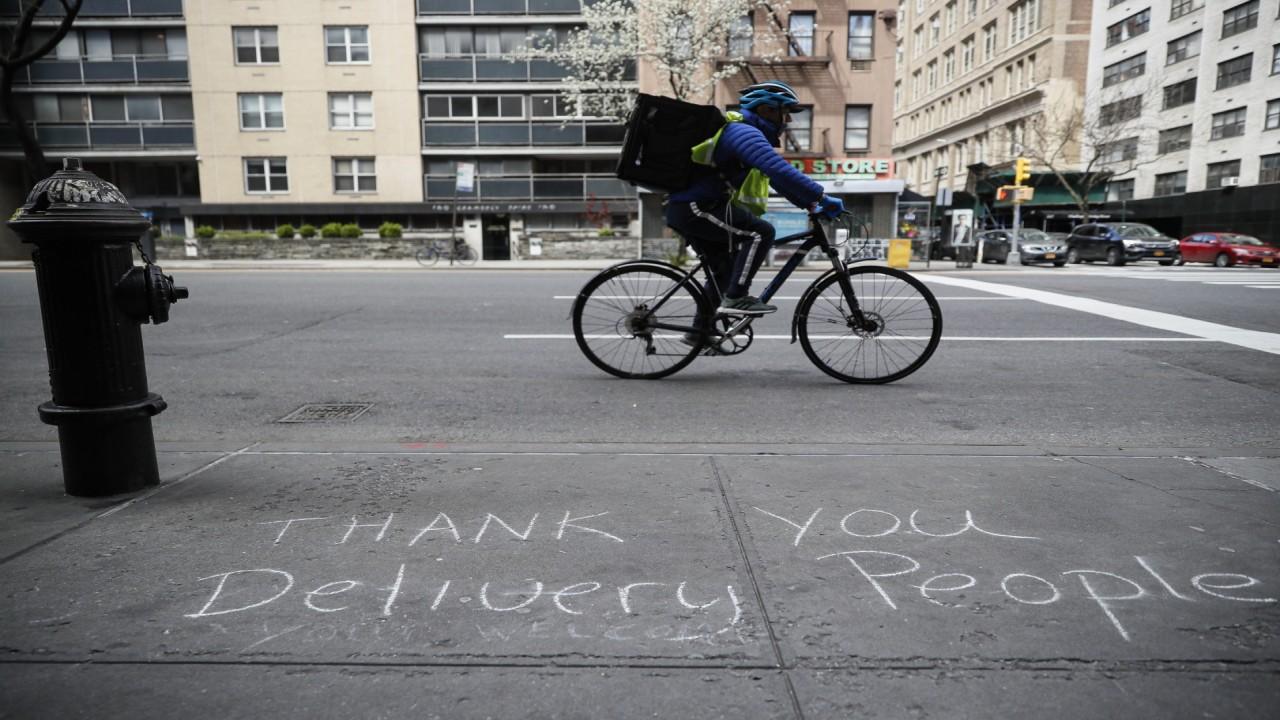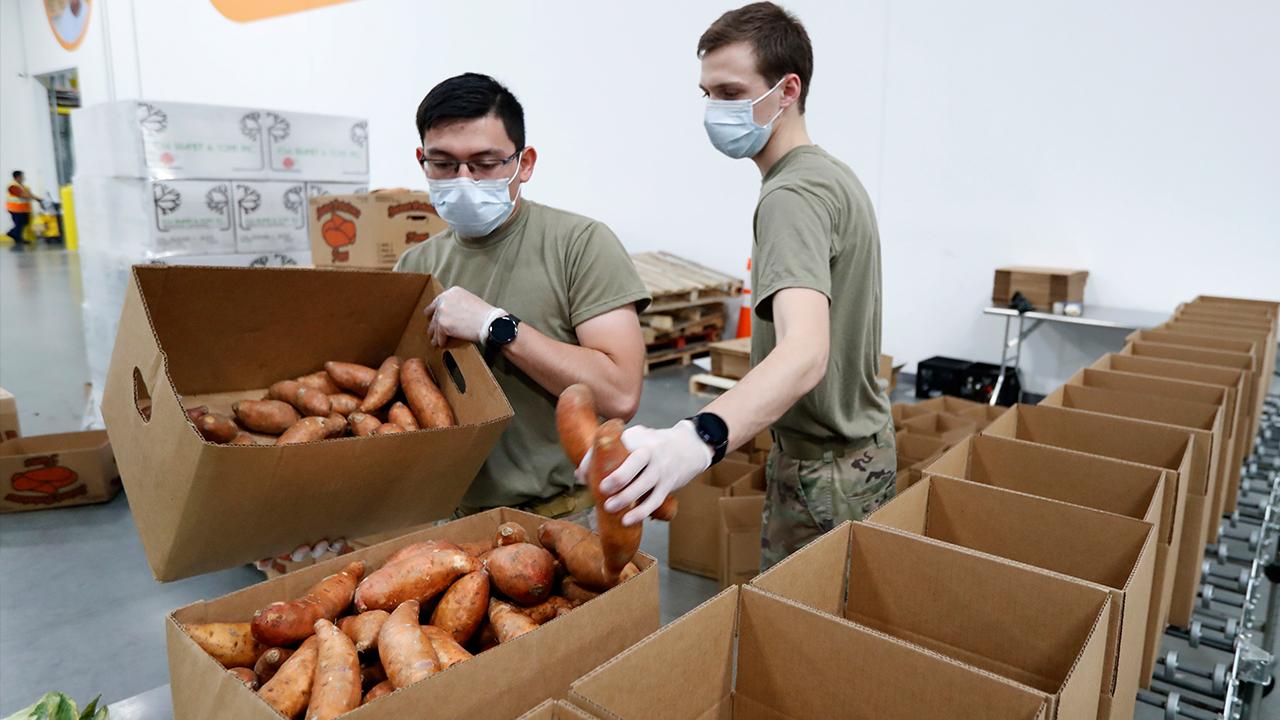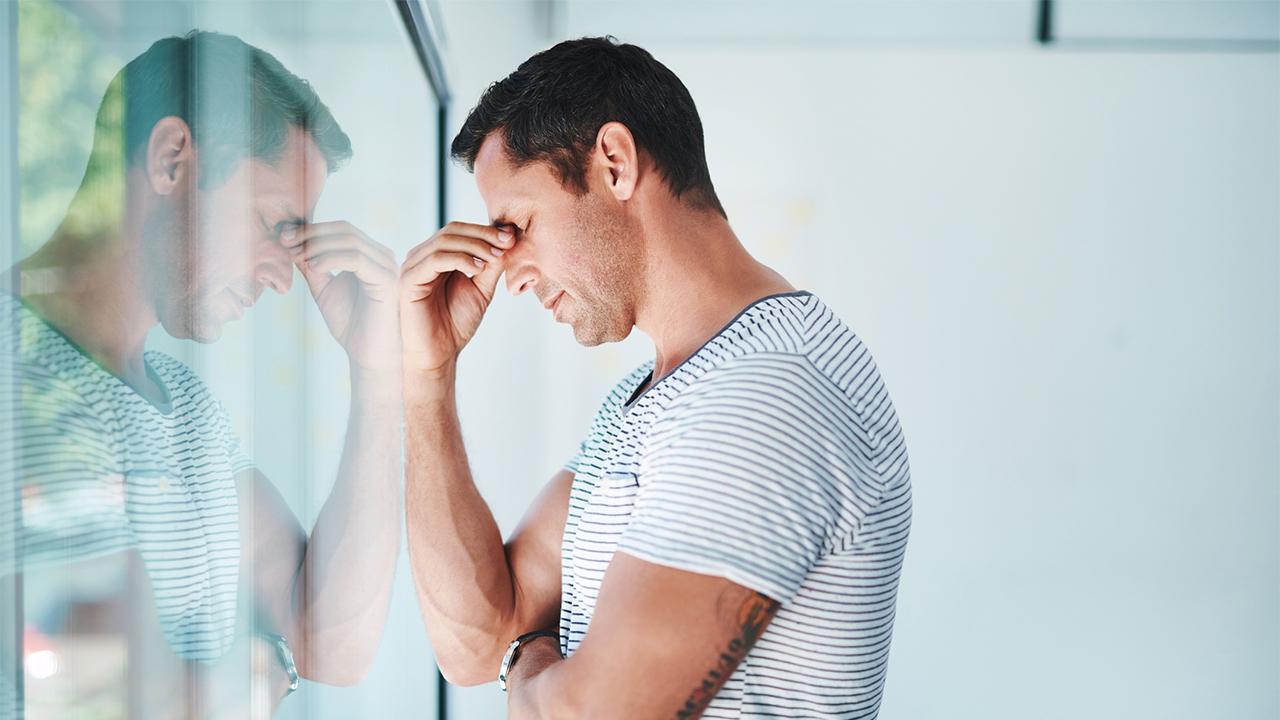Coronavirus emergency kit: What you need to survive the pandemic
'The vast, vast majority of people who get coronavirus will have a mild illness and can be treated at home'
Get all the latest news on coronavirus and more delivered daily to your inbox. Sign up here.
In order to avoid over-burdening already maxed out hospitals, people who have the coronavirus with mild symptoms will be sent home to recover.
"The vast, vast majority of people who get coronavirus will have a mild illness and can be treated at home," Dr. David Markenson, the medical director at the Center for Disaster Medicine at New York Medical College told FOX Business.
However, if a person does get the coronavirus and is sent home to recover, he or she also has to quarantine for at least two weeks to avoid getting others sick.
That's why everyone should prepare their own coronavirus emergency kit with certain medications, cleaning supplies and other items.
WHAT IS REMDESIVIR, GILEAD’S POSSIBLE CORONAVIRUS DRUG THAT’S IN TRIALS?
For those who are quarantining at home, there are some warning signs to look out for, Markenson said, including change in thinking or behavior, difficulty breathing, chest pain, inability to stand or walk, changes in color -- particularly if the person's face or lips become blue -- that would indicate they could need emergency care.
"We always advise you to talk to your health care provider and if you really have warning signs, obviously it's 911 or a hospital," Markenson said.
"If you are going to go seek care somewhere, let them know you're coming because they may wish to take precautions for other patients either in an office or at home or at a facility, or they may ask you to go into a different part of the hospital because they're segregating people to keep people who might have coronavirus from others," he added.
However, if you don't see any of those warning signs, here are the things you'll need to have now in case you or someone else in your household gets the coronavirus, according to several doctors.
For other resources on how to prepare your home for the coronavirus, The American Red Cross has a list of safety tips to follow, according to Markenson, who helped develop the list as the national chair to the Scientific Advisory Council for the American Red Cross.
EXECUTION DRUGS COULD HELP CORONAVIRUS PATIENTS: DOCTORS
Personal protective equipment
Personal protective equipment (PPE), including store-bought or homemade cloth masks, are important.
Hand sanitizer that's at least 60 percent alcohol and soap and water are also essential.
"Washing your hands with soap and water is actually very effective in disinfecting your hands, even just regular old soap that doesn't have any kind of antibacterial properties," Dr. John Mafi, an assistant professor of medicine at the David Geffen School of Medicine at UCLA told FOX Business.
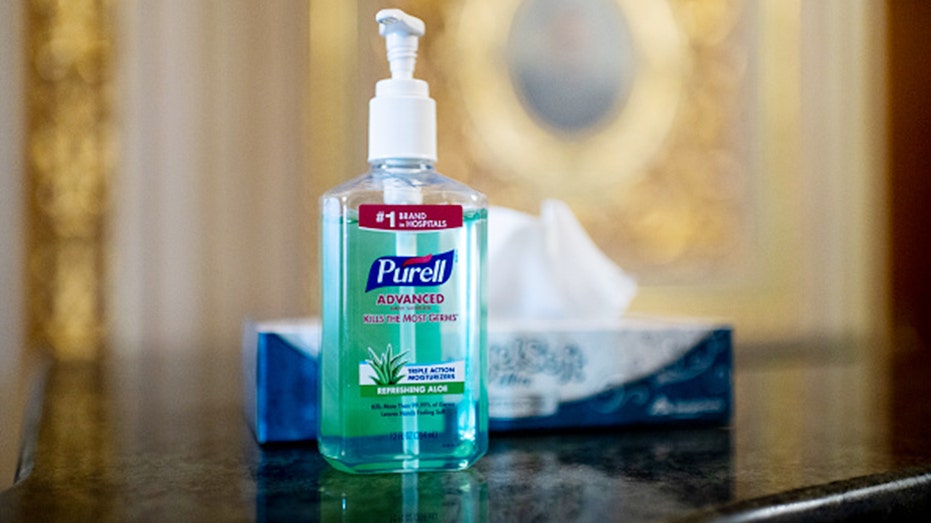
A box of tissues and a bottle of Purrell hand sanitizer sit on the desk in the Senate Reception Room in the Capitol on March 3, 2020. (Photo By Bill Clark/CQ-Roll Call, Inc via Getty Images)
"The details really matter -- so you really want to make sure you're washing your hands for 20 seconds, that you're getting every nook and cranny," he added. "There are studies that show that you miss often your fingertips and under the fingernails. And, you know, you want to make sure you're thoroughly covering every corner with soap and water -- warm water -- and then rinsing and drying. And you want to be doing that frequently throughout the day, especially before a meal."
According to Dr. Peter Chin-Hong, an infectious disease specialist at UCSF, secondary PPE items that aren’t “essential” but would be good to consider having include a gown -- to avoid allowing the virus to land on someone's clothes -- and gloves.
Lotion
With all the hand washing, Mafi said it is also good to consider having a good supply of lotion.
"When you wash your hands so much, you know, you're going to get dry hands," he said.
Cleaning supplies
If someone in your household does get the coronavirus, you'll need supplies to clean off all the surfaces in your house. Even if you're able to isolate the sick person in one room -- which the doctors all recommended -- you may not be able to give them their own bathroom.
If you aren't able to, the bathroom must be cleaned after every time the sick person uses it -- and the person cleaning should wear a mask and gloves, if possible.
CALIFORNIA TOWN OFFERING CORONAVIRUS TESTING TO EVERY RESIDENT
"The caregiver should wait as long as possible before cleaning and disinfecting [the bathroom]," Mafi said.
A specific list of cleaning products that will work against the virus are listed on the EPA website.
"Most most typical household items will work fine," Markenson said. "And if you really want to be simple, you can make your own."
He said all it takes is about five tablespoons of bleach per gallon of water. He did, however, warn about using expired bleach to clean surfaces of the coronavirus.
"Most people have bleach that's been around their house forever and ever and ever," he said. "Bleach actually has expiration dates because it breaks down. So the only caveat I would say is to make sure it's unexpired bleach. Obviously, when you clean your clothes, we're not that concerned."
According to Mafi, once you wipe down a surface, you should wait one minute before touching it again.
"Apparently it takes that long to sort of kill all the bacteria on the surface," he said.
Trash can
Mafi and Chin-Hong both said that having a trash can specifically for the sick person is important.
"You always want to have a container next to the bed of the patient, even a cheap one that you can buy or you have, where you can take out the trash often," Chin-Hong told FOX Business.
Medication
Of course, having enough of your regular medications is important, but if you get the coronavirus, Chin-Hong said you should also make sure you have the right over-the-counter medications to treat the virus' symptoms.
Those medications can include cough syrup, pain reliever -- which can also help with fever -- and anti-diarrhea medicine.
He warned that although some people might have combination-cold medicines -- which usually include a type of pain reliever and cough medicine -- they should be careful about taking too much.
"If they take a combination, they have to really read the instructions because you can overdose on Tylenol and get liver failure," he said. "It's not usually a problem, it's just something people have to think about."
VIDEO GAMING IS THRIVING UNDER CORONAVIRUS CONDITIONS
Medical devices
Mafi suggested also keeping a thermometer -- to monitor your temperature -- and a pulse oximeter -- which measures your blood oxygen levels -- in your medicine cabinet. Just be careful about what kind of pulse oximeter you get, he said.
"Not all pulse oximeters are created equal," Mafi said. "FDA-approved devices for patient care are the best and the next best are consumer-grade. Those are not FDA-approved, but they are at least consumer-grade. And these are like your typical like Target, Walmart."
He said he highly recommends against any iPhone app pulse oximeters because they don't use a probe and instead only use a camera.
"Those are terrible," he said. "Don't use those. Those are misleading and potentially dangerous."
Two weeks worth of food
Aside from needing medications and cleaning supplies, having two weeks' worth of food is important -- but not because there will be a food shortage, according to Chin-Hong.
"The reason why two weeks is the number is because that's the time when people would be quarantined," he said.
Mafi suggested having canned foods, grains, beans, frozen foods and other nonperishables that can last for a long time.
GET FOX BUSINESS ON THE GO BY CLICKING HERE
Clean towels and linens
If someone in your household does get sick, they’ll need their own linens and towels, Markenson said.
"The key is not to share things that have surfaces that can hold on to the virus," Markenson said. "If you're using linens or towels, they can't be shared. You don't have to use throwaway towels, but the person has to have their own linen and towels to use separate from everyone else."
He said the sick person in the household should even have and use their own hand towel that they bring into and out of the bathroom with them.
Sunscreen and bug spray -- for people with have backyards and patios
"When you're quarantined, it does mean you can't go outdoors," Chin-Hong said. "For example, a lot of people have gardens in the back, so you can definitely go in the sun."
So for those people who have backyards or patios who might spend some time outside, being prepared with sunscreen and bug spray is just as important as anything else in your medicine cabinet.
"It's just like other things you would normally have ... because you wouldn't probably be able to go to Walgreens easily if you were quarantined," he said.
Just make sure your sunscreen has at least SPF 15 -- and be sure to wash any bug spray off your hands when you come inside, Chin-Hong said.
A way to communicate with others
Finally, Chin-Hong recommended making sure the sick person has a way to communicate with the outside world, whether that's a smartphone or a tablet or a computer.
"One big thing that people don't often think about is the mental consequences of being quarantined or being told you have COVID or a family member has COVID," Chin-Hong said. "It's a very lonely thing ... and it's anxiety-provoking. People have to really be intentional about having a plan for self-care."
"It's super important because we've been finding that mental illness is actually a very insidious consequence of COVID-19 in both health care providers and in patients because of that loneliness," he added.




















